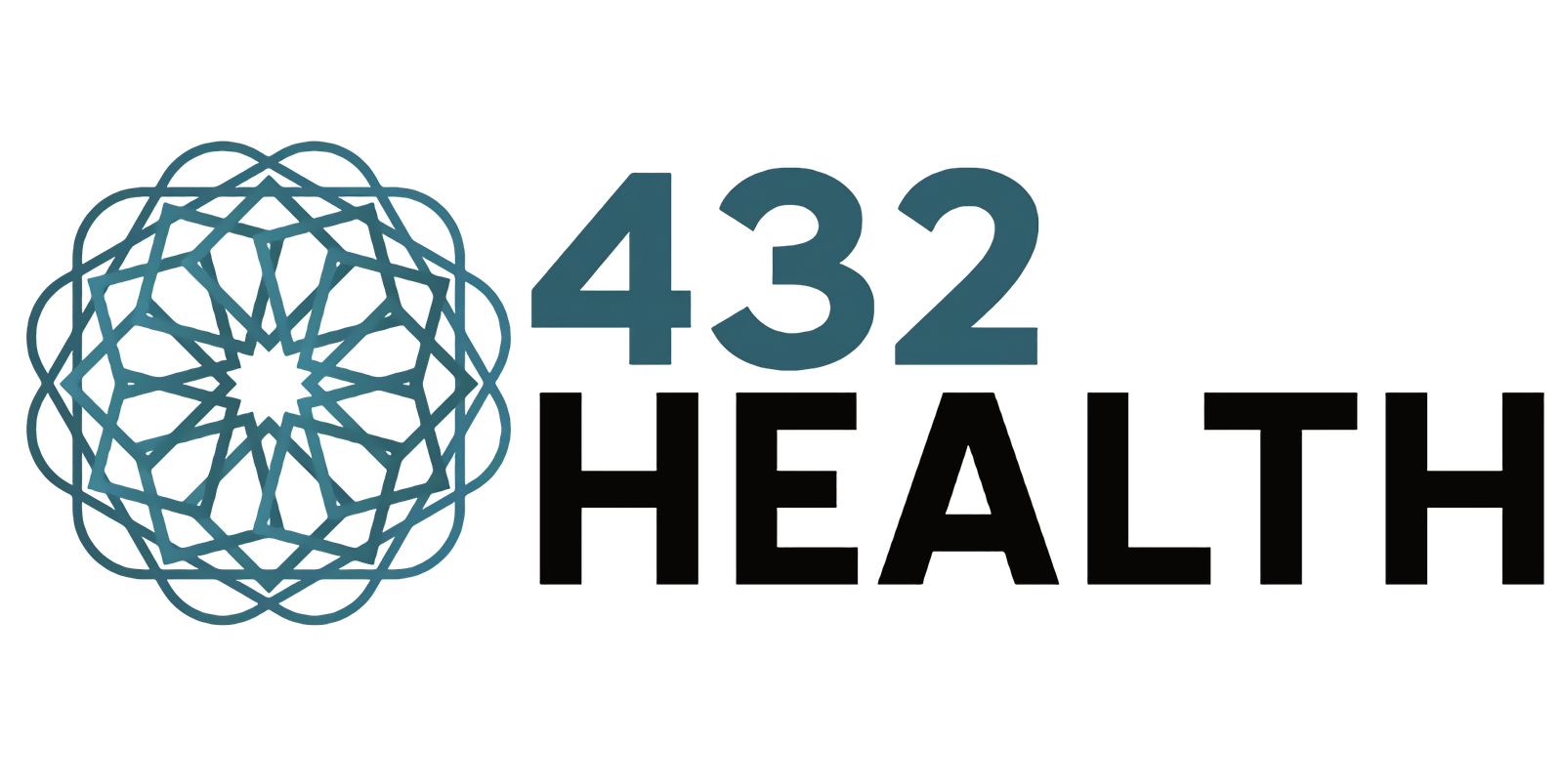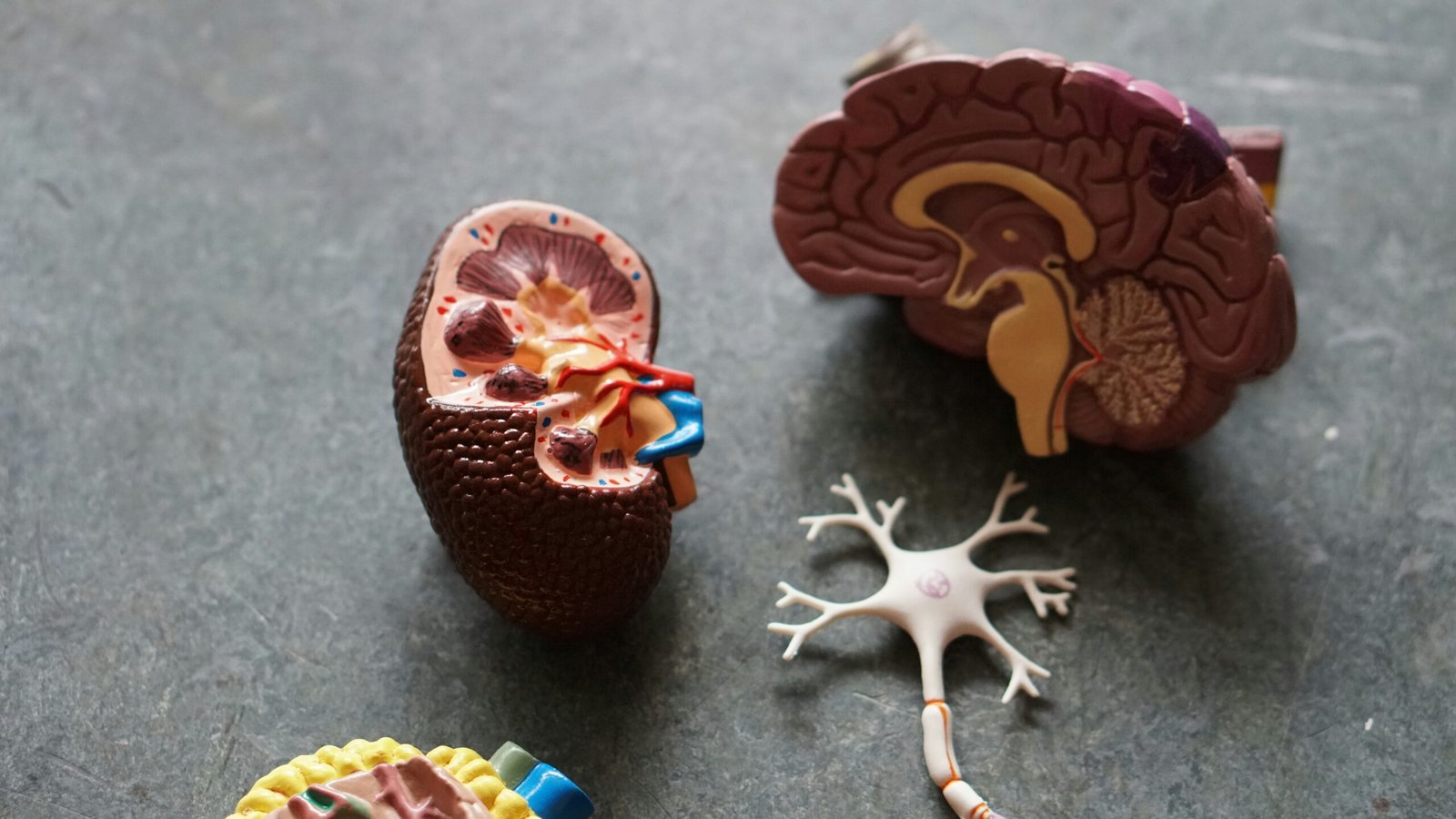Kidney disease refers to a condition where the kidneys are damaged and are unable to function properly. This can lead to a variety of health complications and requires medical attention. There are several forms of kidney disease, each with its own causes and symptoms.
Chronic Kidney Disease: CKD is a long-term condition that gradually worsens over time. It can be caused by conditions like high blood pressure, diabetes, or certain kidney infections. Common symptoms include fatigue, swelling, frequent urination, and changes in urine color.
Acute Kidney Injury: AKI is a sudden and severe form of kidney disease that occurs rapidly. It can be caused by conditions like dehydration, severe infections, or certain medications. Symptoms may include decreased urine output, fluid retention, and confusion.
Polycystic Kidney Disease: PKD is an inherited form of kidney disease where fluid-filled cysts develop in the kidneys. It is usually a progressive condition and can cause kidney enlargement, high blood pressure, and kidney function decline. PKD can also lead to the development of cysts in other organs.
Other forms of kidney disease include glomerulonephritis (inflammation of the kidney’s filtering units), kidney stones (hard deposits that form in the kidneys), and urinary tract infections (infections that affect the kidneys, bladder, or urethra).
Polycystic kidney disease (PKD) is a specific form of kidney disease characterised by the growth of multiple cysts in the kidneys. These cysts can interfere with kidney function over time. PKD is a genetic disorder, and symptoms may not appear until adulthood. Treatment options for PKD focus on managing symptoms and complications, such as high blood pressure and kidney infections.
Remember, early detection and proactive management can help slow the progression of kidney disease and improve overall quality of life.
Sodium Bicarbonate: Treatment
This book is for all individuals interested in taking responsibility for their health and medical treatments. It is the first comprehensive medical review of sodium bicarbonate, which is an essential medicinal for every emergency room, intensive care ward, dental office, clinic and home medicine cabinet. Sodium bicarbonate (Baking Soda) is one of the most useful substances in the world of medicine; it has been used for decades as an adjunct in chemotherapy and is used commonly in emergency room and intensive care wards around the world. This book has a special focus on the use of sodium bicarbonate for cancer treatment but also covers its use in areas of kidney disease, diabetes, treatment of flu, the common cold and other areas of general medicine. Sodium bicarbonate (baking soda) is a true work horse medicine that does everything from saving lives in a heartbeat to curing or diminishing a common cold.
The book challenges the conventional medical establishment by advocating for the use of a simple and inexpensive remedy: sodium bicarbonate. While the medical industry relies on expensive and potentially harmful treatments, sodium bicarbonate offers a safe and effective alternative.
Research shows that sodium bicarbonate can be used to treat a wide range of disorders, including cancer, diabetes and kidney disease. Its effectiveness is backed by both conclusive evidence and theoretical support. Despite its affordability and accessibility, the medical community has been slow to embrace sodium bicarbonate as a universal medicine.
Even oncologists, who are aware of the toxicity of their treatments, have been using sodium bicarbonate to mitigate the harmful effects of chemotherapy and radiation. It is routinely administered to patients to prevent clinical acidosis and treat various conditions. In emergency situations, sodium bicarbonate has proven to be a life-saving intervention.
Dr. Boris Veysman, an emergency medicine specialist, recounts an experience in the emergency room where sodium bicarbonate played a crucial role in resuscitating a patient. The administration of sodium bicarbonate helped correct the patient’s extreme acidity and stabilise her vital signs.
Sodium bicarbonate’s efficacy and widespread use are a testament to its healing properties. This book challenges the status quo and urges medical practitioners to consider sodium bicarbonate as a front-line treatment for various disorders. With its proven benefits and minimal side effects, sodium bicarbonate has the potential to revolutionise the field of medicine.
One of the key benefits of bicarbonate is its ability to relieve pain. When taken orally, bicarbonate can help alleviate pain caused by various conditions, including cancer. This is due to its ability to rapidly shift pH levels in the body, which can help reduce inflammation and discomfort.
Interestingly, bicarbonate has been found to have indications for pain relief from unlikely sources. Research has shown that bicarbonate can be effective in treating oral pain, as well as providing relief for late-stage infections. This highlights the versatility of bicarbonate as a potential treatment option.
In addition to its pain-relieving properties, bicarbonate also plays a foundational role in our physiology. It helps regulate pH levels in the body, ensuring that our internal environment remains balanced and optimal for proper cellular function. This is particularly important in the fight against cancer, as an alkaline environment can help inhibit the growth of cancer cells.
When it comes to oral consumption, bicarbonate can be taken in various forms, such as with organic maple syrup or molasses. If you are in the UK Waitrose offer both. These combinations can enhance the effectiveness of bicarbonate and provide additional health benefits.
It’s worth noting that bicarbonate should not be seen as a replacement for traditional cancer treatments such as Mustard Gas, Radiation or P(harm)aceuticals. However, incorporating bicarbonate into a comprehensive treatment plan may offer additional support and benefits.
Overall, bicarbonate has shown promise in cancer treatment and overall health. Its ability to relieve pain, regulate pH levels, and provide additional health benefits make it a valuable tool for health practitioners and physicians to consider. As more research is conducted, we may uncover even more uses and benefits of this humble compound.
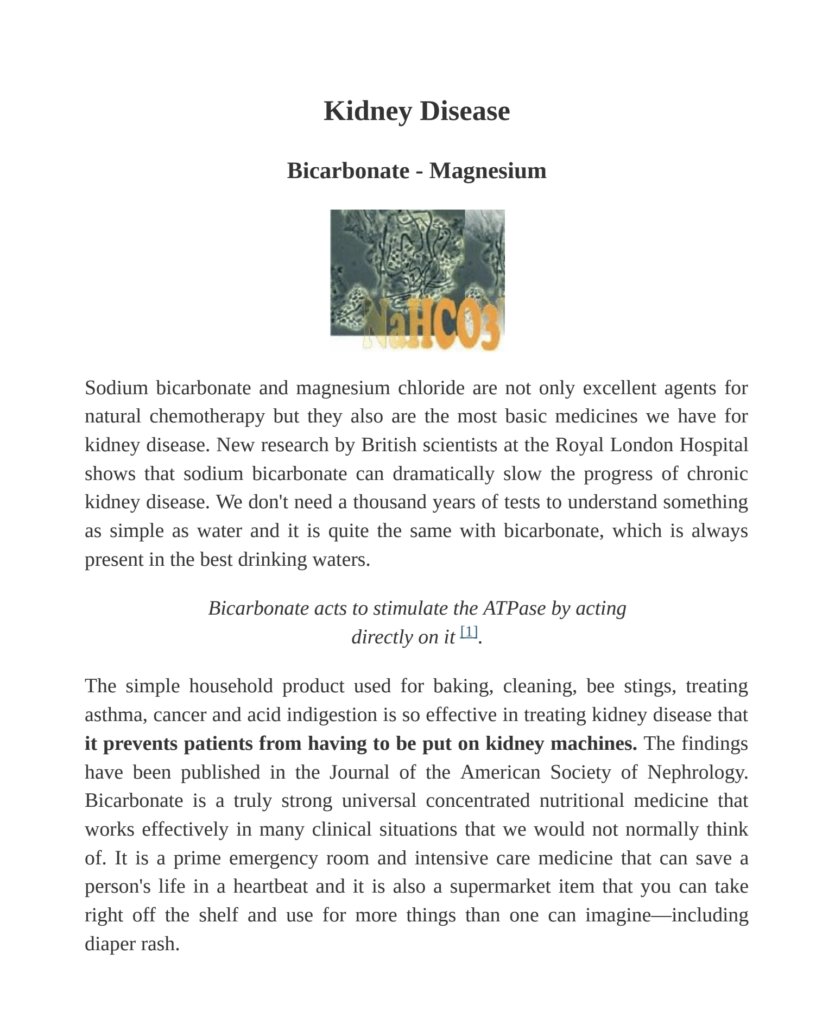
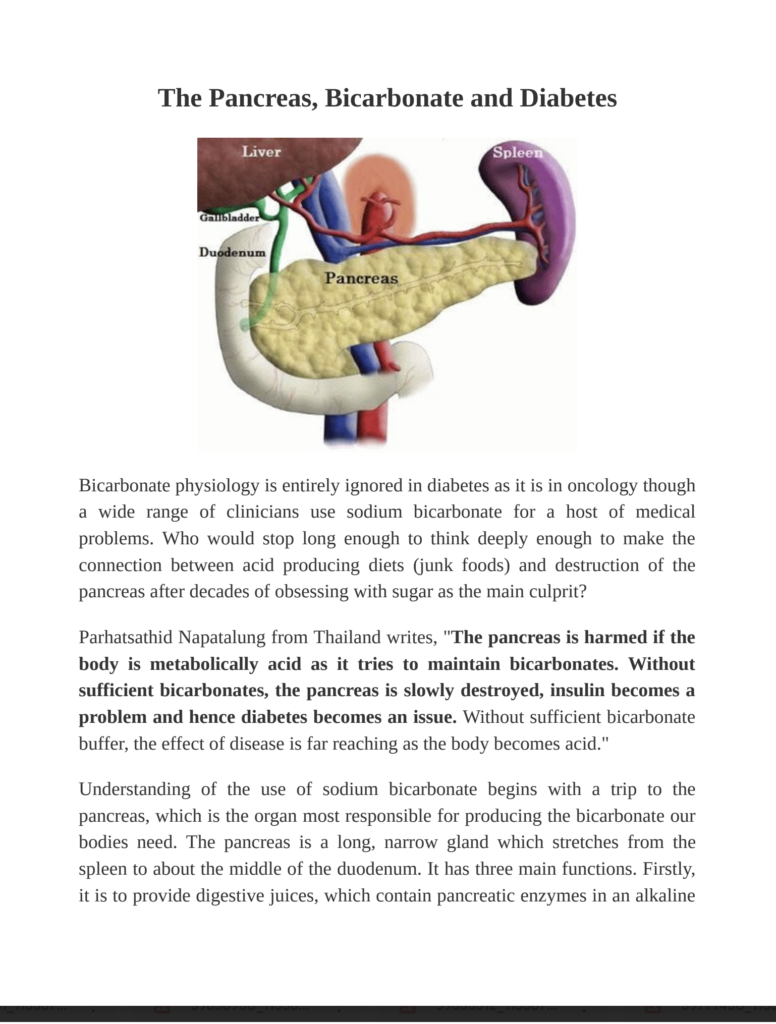


NAN-Acetyl Cysteine is a supplement that offers a wide range of benefits to the Kidneys & Liver.

1. Helps with Detoxification: NAC plays a crucial role in preventing or diminishing kidney and liver damage by aiding in the detoxification process. It reduces oxidative stress levels, making it particularly beneficial for individuals with metabolic dysfunction-associated steatotic liver disease (MASLD) or nonalcoholic fatty liver disease (NAFLD).
2. Boosts Brain Health: By regulating Glutamate and replenishing Glutathione, NAC supports brain function and health. It has shown promise in the treatment of neurological disorders and can potentially improve cognitive function.
3. Stabilises Blood Sugar: Inflammation in fat cells can contribute to imbalanced blood sugar levels. NAC helps decrease inflammation, thereby potentially stabilizing blood sugar and reducing the risk of metabolic disorders.
4. Reduces Heart Disease Risk: NAC’s powerful antioxidant properties help prevent oxidative damage, which is a contributing factor to heart disease. By protecting against oxidative stress, NAC may help lower the risk of cardiovascular complications.
5. Strengthens the Immune System: NAC boosts Glutathione levels in the body, which in turn strengthens the immune system. This can lead to improved overall health and a reduced susceptibility to infections.
6. Improves Mental Health and Addiction: Studies have shown that NAC may improve symptoms of psychiatric disorders and addictive behavior. It can help reduce cravings and support mental well-being.
7. Relieves Respiratory Conditions: NAC has been found to alleviate symptoms of respiratory conditions such as chronic bronchitis and chronic obstructive pulmonary disease (COPD). It helps thin mucus and supports lung function.
8. Enhances Fertility: Both men and women can benefit from NAC supplementation when it comes to fertility. It may improve reproductive health and increase the chances of conception.
N-Acetyl Cysteine (NAC) is a well-tolerated dietary supplement with numerous benefits for kidney and liver health, brain function, heart disease prevention, immune support, mental health, respiratory conditions, and fertility. Consider incorporating NAC into your daily routine to experience its potential advantages for your overall well-being.
The Importance of Clean Water for Kidney Health
When it comes to kidney health, clean water plays a vital role. Kidney disease encompasses various conditions, including glomerulonephritis (inflammation of the kidney’s filtering units), kidney stones, and urinary tract infections. Ensuring access to clean water is crucial in preventing and managing these conditions.
One popular belief is that distilled water is the purest form of water, and it can have potential benefits for kidney health. Distillation involves boiling water and then condensing the steam, leaving behind impurities. This process removes minerals, chemicals, and contaminants, resulting in water that is free from impurities.
Distilled water has been suggested to prevent and even remove kidney stones. Kidney stones are hard deposits that form in the kidneys and can cause severe pain and discomfort. By drinking distilled water, individuals may reduce their risk of developing kidney stones, as it lacks the minerals that contribute to stone formation.
Additionally, some people recommend adding a little bicarbonate (bicarb) to distilled water for its potential benefits. Bicarbonate is a natural substance that helps regulate the body’s pH levels and can aid in reducing acidity in the urine. This may help prevent the formation of certain types of kidney stones.
For individuals with polycystic kidney disease (PKD), distilled water is often recommended. PKD is an inherited form of kidney disease where fluid-filled cysts develop in the kidneys. It is usually a progressive condition and can cause kidney enlargement, high blood pressure, and kidney function decline. Drinking distilled water can help minimize the intake of minerals and impurities that may exacerbate the symptoms of PKD.
Distilled water can be a beneficial choice, especially for individuals at risk of kidney stones or those with conditions like PKD.
In addition to clean water, there are a few natural remedies that can further support kidney health. Colloidal silver is one such remedy that is known for its immune-boosting properties. It can help strengthen the immune system, making it more resilient against infections that can potentially affect the kidneys.

Another beneficial supplement for kidney health is black seed oil. Black seed oil has been used for centuries for its various health benefits, including its potential to help regulate blood sugar levels. Stable blood sugar levels are important for kidney health, as high blood sugar can put strain on the kidneys over time.
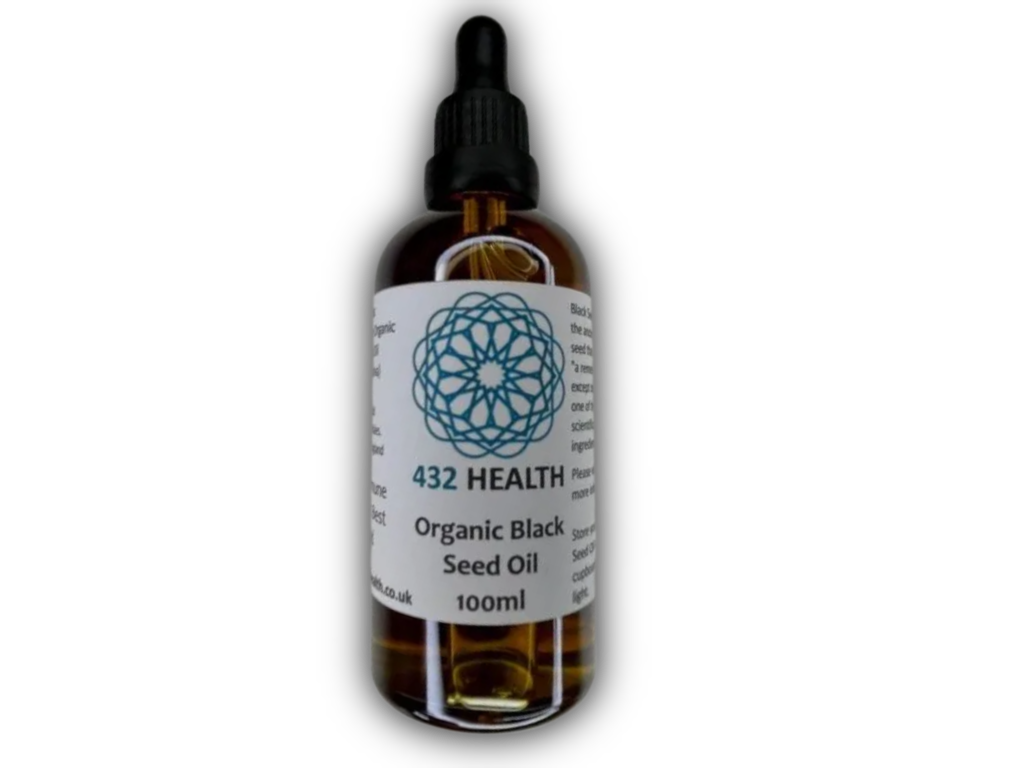
While clean water, colloidal silver, and black seed oil can be beneficial for kidney health, it is always important to consult with a healthcare professional before starting any new supplements or making significant changes to your diet. They can provide personalized advice based on your individual health needs.
Remember, taking care of your kidneys is essential for overall well-being. Incorporating these natural remedies, along with a balanced diet and regular exercise, can help support optimal kidney function and promote a healthy lifestyle.
